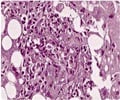Kevin J. Tracey, MD, president of The Feinstein Institute for Medical Research, says it is time to take a fresh look at the medical community's approach to treating sepsis.

The review, co-written by Dr. Tracey and Clifford S. Deutschman, professor of Anesthesiology and Critical Care at the University of Pennsylvania, notes that unlike other major epidemic illnesses, treatment for sepsis is nonspecific and limited primarily to support of organ function and administration of intravenous fluids, antibiotics and oxygen. There are no approved drugs that specifically target sepsis. They argue that to develop therapeutic options that treat sepsis, a new approach might be needed.
Sepsis, Drs. Tracey and Deutschman wrote, "is not a stereotypical, steadily progressive immunological process that follows infection or injury; that innate and adaptive immune responses do not inevitably damage host cells; and that the long-held notion that sepsis is a distinct immunological disorder is incorrect. Rather, understanding sepsis requires reframing the research focus to identify immunometabolic and neurophysiological mechanisms of cellular and organ dysfunction."
The review explains that severe sepsis and persistent critical illness (PCI), which result in organ dysfunction that lasts for weeks or months, are not immunopathologies as previously thought. Immunopathology is a branch of medicine that deals with immune responses associated with disease. It includes the study of the pathology of an organism, organ system, or disease with respect to the immune system, immunity, and immune responses. Much of the efforts to treat sepsis have been focused in this area. Although much has been learned about sepsis and PCI as a result, this approach has not led to any currently approved targeted treatment.
Recent discoveries indicate that severe sepsis and PCI are not caused by immune system dysfunction alone, but also by a failure of homeostasis – a failure in the body to maintain stability of its internal environment in response to changes in external conditions. Now that researchers know this, it will be crucially important to study aspects of homeostasis, including the deregulation of metabolism, neural reflexes, energy utilization and cell stress. Greater understanding in these areas has potential for resulting in improved and effective treatment for severe sepsis and PCI.
 MEDINDIA
MEDINDIA




 Email
Email





